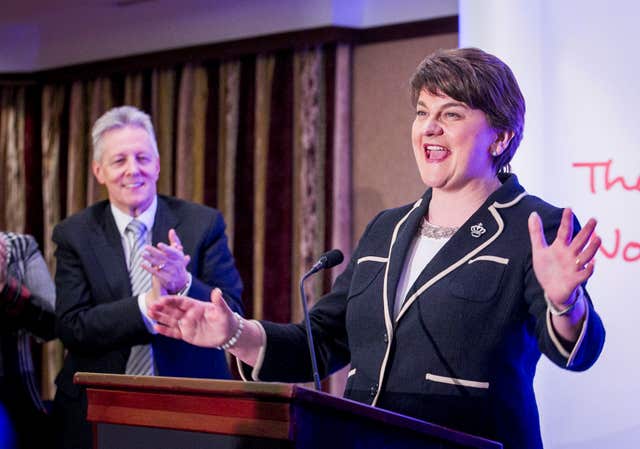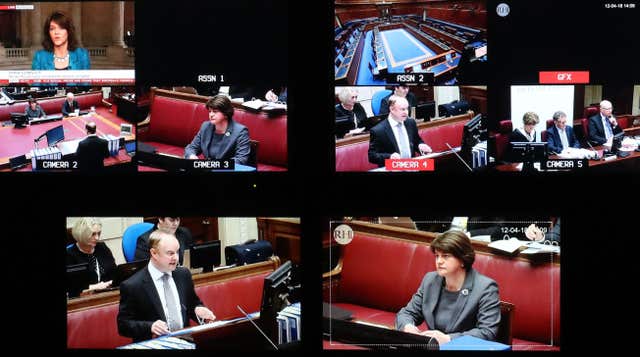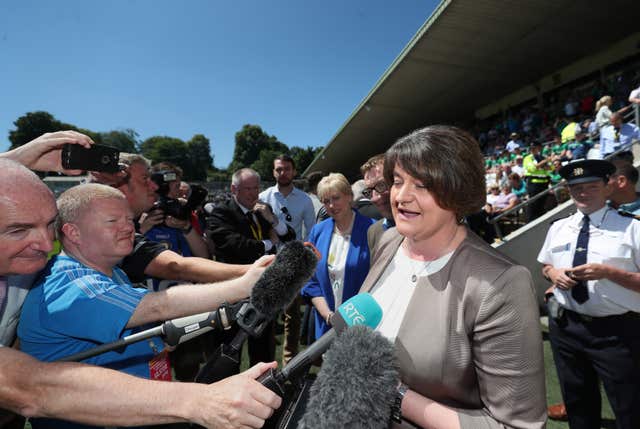When Arlene Foster replaced the retiring Peter Robinson in late 2015 her position as the leader of unionism in Northern Ireland looked unassailable.
For Mrs Foster, a passionate supporter of the royal family, it was an uncontested coronation as DUP leader and Stormont First Minister.
The following year the first woman to lead the party founded by Ian Paisley defied the pundits to repeat the DUP’s best ever election result in the 2016 Assembly poll.
At that point it appeared the former solicitor, who survived two horrific childhood experiences of IRA violence, carried vast moral authority among unionist voters to govern alongside Sinn Fein.
But a little over six months later Mrs Foster was engulfed in crisis, when revelations emerged about a potentially huge overspend of public money as a result of flaws in a green energy scheme – the Renewable Heat Incentive (RHI) – introduced during her time as Stormont economy minister.

In early 2017, Mrs Foster was forcibly removed from her job as First Minister when the then deputy first minister, the late Martin McGuinness, resigned in protest at her handling of the RHI scheme.
The subsequent snap Assembly election in March that year was disastrous for the wider unionist family, which lost its overall majority for the first time.
The gap between the DUP and Sinn Fein was reduced from 10 seats to just one.
Mrs Foster’s conduct during the campaign, in particular her characterisation of members of Sinn Fein as “crocodiles” in their push for Irish language laws, was cited as a galvanising factor for the nationalist and republican electorate.
While a subsequent 2020 public inquiry report on the RHI identified some failings in Mrs Foster’s actions, it cleared her of any major wrongdoing.
But by that stage the reputational damage had been done and the perception of her as a safe pair of ministerial hands had been dented.
If Stormont’s collapse and the 2017 Assembly election had placed Mrs Foster’s future in doubt, her stock was unexpectedly restored when Theresa May called the snap general election and the DUP emerged as a key player in the resultant hung parliament.
Her stewardship of the party from that point onwards, as she was thrust into centre stage of the Brexit divorce drama, is set to define her legacy as DUP leader.
Born Arlene Kelly in 1970 near the village of Rosslea in rural Co Fermanagh, her peaceful upbringing was shattered at the age of eight when the IRA tried to murder her late father John, a farmer and reserve police officer.

Mrs Foster has spoken of the trauma of seeing him come crawling into their isolated farmhouse on all fours with blood streaming down his face after being shot in the head.
He survived the attack but the family were forced to flee their home and the young Arlene had to change school.
In recent days Mrs Foster has again been confronted with reminders of that shocking incident, when Sinn Fein participated in a commemoration for Seamus McElwaine, the IRA man suspected of involvement in the attempted murder of her father.
She has previously spoken of her difficulty in sharing power alongside Mr McGuinness, given that he delivered a graveside oration for McElwaine.
As a teenager in 1988, Mrs Foster survived another republican attack when the IRA targeted the part-time Ulster Defence Regiment soldier who was driving her school bus.
The Collegiate Grammar School student escaped relatively unscathed but a friend sitting close by suffered serious injuries.
Mrs Foster, 50, still lives in Fermanagh with her husband and three children – a daughter and two sons.
The political journey of the current Fermanagh and South Tyrone MLA began while studying law at Queen’s University in Belfast, where she joined the Unionist Association, part of the UUP.

Although she worked as a solicitor for more than a decade after graduating, she remained politically active, chairing the UUP’s youth wing and becoming an honorary member of the party’s ruling council.
Her political teeth were cut as a councillor on Fermanagh District Council, where she represented the Enniskillen ward for five years.
But just weeks after being elected to the Assembly in 2003, she, alongside Jeffrey Donaldson, now the DUP’s Westminster leader, decided to quit the UUP.
The pair had been part of a tight-knit group dubbed the “baby barristers” who opposed the Good Friday Agreement, the release of paramilitary prisoners and the direction in which their then leader, David Trimble, was taking the party.
After defecting to the DUP in January 2004, her rise through the ranks was rapid, with high-profile ministerial roles including the environment, economy and finance portfolios.
It was a trajectory that took her all the way to the First Minister’s office and on to the steps of Downing Street, as she struck a historic confidence and supply deal with the Tories.
Her career may now ultimately be judged by how she handled being presented with that key to No 10.




Comments: Our rules
We want our comments to be a lively and valuable part of our community - a place where readers can debate and engage with the most important local issues. The ability to comment on our stories is a privilege, not a right, however, and that privilege may be withdrawn if it is abused or misused.
Please report any comments that break our rules.
Read the rules here